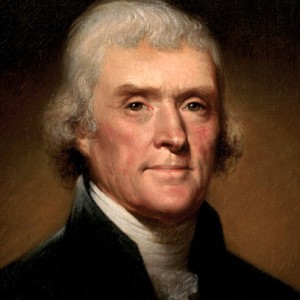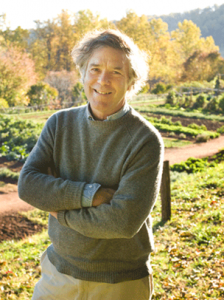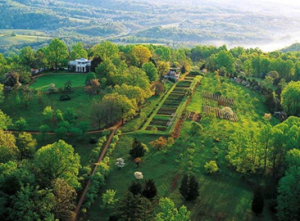By Doc Lawrence –
 Thomas Jefferson was no ordinary farmer. The author of the Declaration of Independence and the third president of the United States, Jefferson was also a revolutionary gardener. Accounts of his adventure with crops are available today from his journals showing that he literally counted the peas and beans picked and placed into containers. The more we study of this man of the Enlightenment, the more we learn that he practiced farm-to-table almost daily serving his vegetables paired with wines from Europe whenever guests were lucky enough to be around for dinner.
Thomas Jefferson was no ordinary farmer. The author of the Declaration of Independence and the third president of the United States, Jefferson was also a revolutionary gardener. Accounts of his adventure with crops are available today from his journals showing that he literally counted the peas and beans picked and placed into containers. The more we study of this man of the Enlightenment, the more we learn that he practiced farm-to-table almost daily serving his vegetables paired with wines from Europe whenever guests were lucky enough to be around for dinner.
The vegetables and herbs Jefferson favored are thriving today in the terraced vegetable garden at Monticello. Under Peter J. Hatch’s brilliant management and direction, the restored vegetable garden features the same assembly of plants Jefferson cultivated in the early nineteenth century serving as a living expression of his distinctly American attitudes.

Mr. Hatch came to Atlanta to introduce his well-received book, A Rich Spot of Earth: Thomas Jefferson’s Revolutionary Garden at Monticello, and to address a sold-out engagement at the Atlanta History Center on behalf of the Center’s Cherokee Garden Library. With over 25,000 rare and valuable books, photographs, manuscripts, seed catalogs and landscape drawings that are included in the library collection, the story of horticulture and botanical history in the Southeastern United States and areas of influence throughout America, Europe, and Asia is told now and preserved for future generations. At such gatherings, Thomas Jefferson’s spirit is omnipresent, fostering open minds, scholarship, good living and occasionally encouraging a little dirt on the hands of a gardener.
Hatch’s book is on my holiday gift list for friends, a few gourmets, home gardeners and those who love the cultural core of America. This masterpiece is enriched with memorable anecdotes, words from Jefferson’s meticulous journals and photographs that prompt an urge to till the backyard soil. According to Hatch, Jefferson’s garden, part of Monticello’s 2,000 acres, was also a vehicle for social change. Jefferson wrote that: “[t]he greatest service which can be rendered any country is to add a useful plant to its culture.” Another quote Jefferson wrote in 1819 is provided by Hatch, who serves as an adviser for First Lady Michelle Obama’s White House kitchen garden: “I have lived temperately, eating little animal food, and that … as a condiment for the vegetables, which constitute my principle diet.”
 With an introduction to the book by Alice Waters, Jefferson is presented not just as an important Founding Father but a man of the soil who loved the good earth surrounding his home, working in garden beds and planting with dirty hands. He was heavily influenced by France, a conclusion supported by his wine cellar at Monticello and the quantities of Bordeaux that were always ready to be poured and enjoyed for dinner guests.
With an introduction to the book by Alice Waters, Jefferson is presented not just as an important Founding Father but a man of the soil who loved the good earth surrounding his home, working in garden beds and planting with dirty hands. He was heavily influenced by France, a conclusion supported by his wine cellar at Monticello and the quantities of Bordeaux that were always ready to be poured and enjoyed for dinner guests.
Love of farming, the concept of terroir, eating food locally grown and drinking appropriate wines may have originated with Jefferson’s love of France, but as he did with the philosophy of John Locke in drafting the Declaration of Independence, he synthesized what he learned, making everything American. Hatch states “Jefferson’s Monticello garden was an Ellis Island of introduced economic plants.”

Jefferson’s imperfections as a slave owner are addressed by Hatch who discusses the African-American gardens that “allowed enslaved people to reserve a degree of autonomy from Jefferson’s purview.”
This book presents a potpourri of images including catalogs, 19th century gardens, and Jefferson’s diagrams plus photographs of the fruits and vegetables produced in the garden. Gardening and vegetables were important essentials to the life of Jefferson and his neighbors, whether Virginians or in faraway states. Gardening, Hatch says, was a unifying endeavor for communities, which Jefferson was an almost constant unifying leader in both his work in the field and his legendary feasts. Plants from the four corners were grown there and many found there way onto the Monticello dinner table on the way to becoming part of America’s living culinary heritage.
Peter J. Hatch’s book is a nominee for the Pulitzer Prize.
F&M

